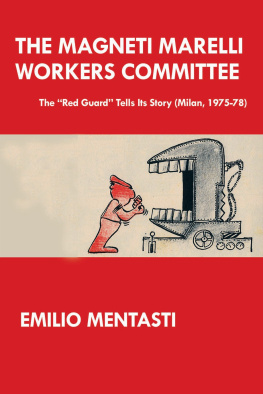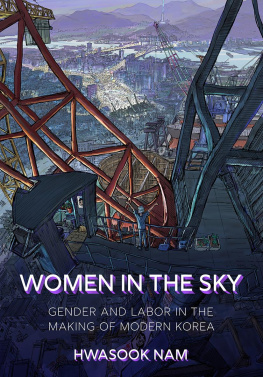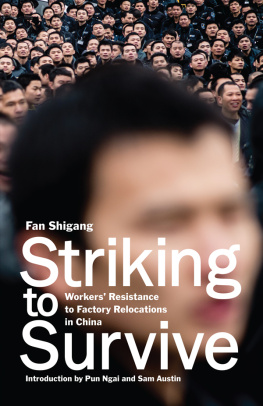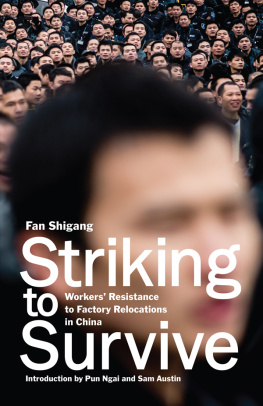Minor Compositions Open Access Statement Please Read
This book is open access. This work is not simply an electronic book; it is the open access version of a work that exists in a number of forms, the traditional printed form being one of them.
All Minor Compositions publications are placed for free, in their entirety, on the web. This is because the free and autonomous sharing of knowledges and experiences is important, especially at a time when the restructuring and increased centralization of book distribution makes it difficult (and expensive) to distribute radical texts effectively. The free posting of these texts does not mean that the necessary energy and labor to produce them is no longer there. One can think of buying physical copies not as the purchase of commodities, but as a form of support or solidarity for an approach to knowledge production and engaged research (particularly when purchasing directly from the publisher).
The open access nature of this publication means that you can:
read and store this document free of charge
distribute it for personal use free of charge
print sections of the work for personal use
read or perform parts of the work in a context where no financial transactions take place
However, it is against the purposes of Minor Compositions open access approach to:
gain financially from the work
sell the work or seek monies in relation to the distribution of the work
use the work in any commercial activity of any kind
profit a third party indirectly via use or distribution of the work
distribute in or through a commercial body (with the exception of academic usage within educational institutions)
The intent of Minor Compositions as a project is that any surpluses generated from the use of collectively produced literature are intended to return to further the development and production of further publications and writing: that which comes from the commons will be used to keep cultivating those commons. Omnia sunt communia!
Support Minor Compositions / Purchasing Books
The e-book you are reading is an electronic version of a physical book that can be purchased through booksellers (including online stores), through the normal book supply channels, or Minor Compositions directly. Please support this open access publication by requesting that your university or local library purchase a physical printed copy of this book, or by purchasing a copy yourself.
If you have any questions please contact the publisher: .
The Magneti Marelli Workers
Committee
- The Red Guard tells its story (Milan, 1975-78)
Emilio Mentasti
ISBN 978-1-57027-363-6
Cover design by Haduhi Szukis
Interior design by Margaret Killjoy
Released by Minor Compositions 2020
Colchester / New York / Port Watson
Minor Compositions is a series of interventions & provocations drawing from autonomous politics, avant-garde aesthetics, and the revolutions of everyday life.
Minor Compositions is an imprint of Autonomedia
Distributed by Autonomedia
PO Box 568 Williamsburgh Station
Brooklyn, NY 11211
www.autonomedia.org
Contents
To those who died at work
Introduction to the English edition
Ever since the 1970s there has been a steady trickle of information into the English-speaking world about the working class movement in Italy during its most intense phase in the whole of the second half of the twentieth century (roughly from 1968 to 1977). The flow of texts started with material translated and distributed by political activists sympathetic to what was happening in Italy. The Red Notes pamphlets (1974 onwards) were the first indication that many non-Italian speakers in the UK had of what was going on. Other translated texts sometimes appeared for example, the group around the Rising Free bookshop in north London published the pamphlet Take Over the City (largely a reprint of an article of the same name by Lotta Continua), along with news about Italy.
In the US, the bi-monthly magazine Radical America (founded in 1967 by some members of Students for a Democratic Society) contained quite a few very informative articles about Italy, between 1971 and 1976.
More recently, references to the 1970s Italian movement and the political ideas which informed it and were produced by it broadly speaking, the Marxist theoretical and practical current known as Operaismo
All this has made available much useful material about political theory and some of the more inspiring activities carried on outside workplaces proletarian shopping etc. It has also brought a certain obsession with armed groups, often divorced from any context of who carried out acts of armed violence and what their relationship was to the wider class struggle.
Despite all this, though, very few accounts have been made available of what Italian workers in large workplaces actually did. How they organised themselves, what their concrete relationship was with initiatives taken outside workplaces (around housing, self-organised price reduction, the student movement, the womens movement), what their real relationship was with the unions, the political parties, student activists, armed groups
From the late 1970s onwards, information also started to become available about the vicious state repression that comrades in Italy were being subjected to. It was possible to read about the arbitrary mass arrests and imprisonment and the absurd trumped up terrorism charges that forced many people (including the famous Toni Negri) into exile. But much less has been written about the real policies of repression which brought an end to the movement the restructuring of the economy, partly carried out precisely to break up big concentrations of militant workers and (as in other industrialised countries) to subject wage labourers in general to the discipline of mass unemployment. It was the process of relocation, decentralisation and automation of workplaces that proved so hard for workers to resist. Much harder to resist, in fact, than false accusations of being leaders of the Red Brigades, even if direct state repression certainly played a role in the suppression of particular workers committees, including the one at Magneti Marelli, as is described in this book.
So, apart from a desire to set the historical record straight, why do we want to dig up the story of the Magneti Marelli workers? After all, both the technology of production and the organisation of labour processes have changed a lot in the last 40 years. Why do we think that the struggles at Magneti Marelli have anything to teach us today?
For a start, however much technology changes and lifestyles of workers outside the workplace may change, the tendency for capital to recreate the factory in new sectors of the economy does not go away. The despotic command of the assembly line, whether a classical one in a car factory or a modern electronics factory (Foxconn!), or a slightly modified one in an Amazon warehouse, or a more virtual one imposed by just-in-time production and global supply chains, doesnt change that much. Likewise, the figure of the hated foreman (even though they might now be called a team leader and not be a man) is as real as ever. And it is in the factory (in the widest sense) that the class contradictions are at their most stark and where there is the greatest potential for collective resistance on the part of the wage-labouring class. Nor have the immediate things that the workers fought against changed: the inhuman pace of work, wages that dont keep pace with inflation, wage hierarchies that set workers against each other
The struggle of workers against the despotism of the factory is nothing new, nor is it particularly unusual, even in a period of relative social peace like the one we experience today. But workers struggle and
Next page








